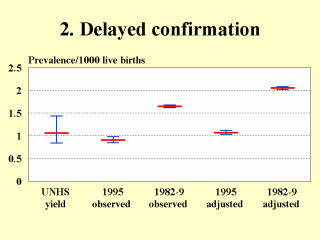 |
Confirmation of
impairment may be delayed in some cases. Delayed confirmation of children with congenital
impairments has certainly been the case in the past. Earlier confirmation and
intervention, by 6 months of age, has been shown to lead to improved outcomes1
and is a major argument for neonatal hearing screening. However, if all of the rise not
attributed to acquired impairment was accounted for by delayed identification, then the
yield we see from universal neonatal hearing screening would be close to the aggregate
prevalence in slides 10 and 11. The yield from well-conducted universal screening
programmes in the UK is only 1.06/1000 (ci 0.84-1.44) - close to the prevalence reported
here for the youngest cohort (1995), and the upper confidence limit (1.44) falls outside
the confidence limits for both observed (1.62) and adjusted (2.02) prevalence. |
